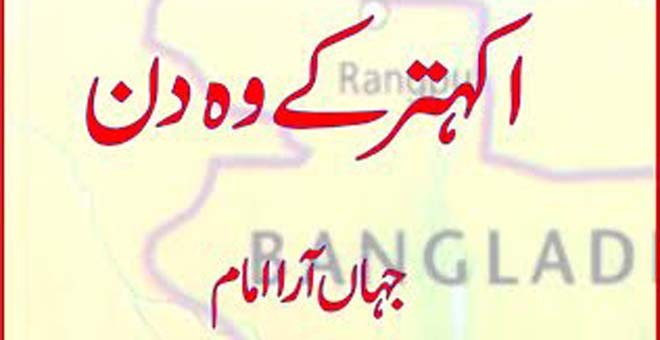

It was March 1, 1971 that she picked up and started writing whatever was worth noticing in those tumultuous times. Something horrible was bound to happen which might change the fate of the Bengalis. In the hearts of their hearts, they knew they will have to pay a heavy price for clamouring for their rights. The city was Dhaka where the writer of the diary, Jahan Ara Imam, was living with her whole family. She didn’t know the worse was yet to come. She didn’t stop writing and thus her diary became a chronicle of the days that culminated in the liberation of the Bengali people.
Like millions of other Bengalis, she too paid a price for freedom as her son was picked, tortured and later brutally killed by the Pakistani army. Her husband died of cardiac arrest as the gory events were too much for his nerves. She faced all this with a stoic resolve and courage. She wrote the diary in Bangla and its Urdu translation was done by a Bengali artist Munawar Mehdi who was prodded by noted author Ahmad Salim into doing it.
Ahmad Salim revised and edited the translation. The result is the book Ikahtar Kay Wo Din, a courageous diary of a nation at war. Jahan Ara Imam is today referred to as ‘Shaheed Janani’ (Martyr Woman) by the government of Bangladesh and a museum has been set up in her name.
From the start, you can feel that she is much worried about her son Roomi who is an angry young man who has joined the rebel ‘Mukti Bahni’ to free his motherland. She knows that one day she will have to sacrifice her son but she tried to allay these fears by consulting palmists. Here, she acts like a doting mother who wants to see her son free of all fears and threats.
Slowly all the people gather and decide to take the onslaught of West Pakistan’s brutal force. Her trustworthy cook Sobhan decides to leave the job one day. She notes in her diary, "I feel sad due to another reason. Our cook Sobhan has left the job as he does not like cooking these days. He wants to join the freedom movement. I don’t have any objection his joining the movement but the question is who will cook delicious dishes for us".
Read what she wrote on March 27, 1971 in her notebook and you will notice tragedy and only tragedy all around Dhaka. She seems aghast to know that many senior teachers of the Dhaka University have been brutally killed by the Pakistan army. There are countless other calamites and she feels she might have a nervous breakdown. "Nobody can tell with authenticity about the whereabouts of Sheikh Mujeeb. Some people are of the view that he has been killed while a few others say he has been incarcerated. Many Awami League leaders have been killed and others have fled. I listened to many gory incidents narrated by many people. I visited a few areas of the city and I can say that the tragedy is beyond words. My heart is bleeding and I want to know whether the perpetrators of these horrible crimes are human beings or brutal animals. Even the Hell is not suitable for the crimes they have committed", she writes with a broken heart.
One day she finds her home surrounded by the Pakistan Army and they pick up her husband along with her two sons. That was the last time she saw her intellectual activist son Roomi who was tortured and then there was no trace of him. She visits many shrines and offers sacrifices for the safe return of his son. She visits a holy figure Pagla Pir to seek his prayers but to no avail. He sacrificed his life for his beloved motherland and thus even the prayers of Pagla Pir could not bring him back.
Jahan Ara Imam shows extraordinary fortitude and courage during all these nine months which earned her the befitting title of ‘Shaheed Janani’.
The translation is smooth but there are many proofreading glitches that should be removed in the next edition. The publisher of the book deserves credit for bringing out this book as many publishers had refused to publish it. Ahmad Salim’s brief introduction helps us understand what the diary is all about. Every sentient Pakistani must read this diary if he has courage to see his image in the mirror.